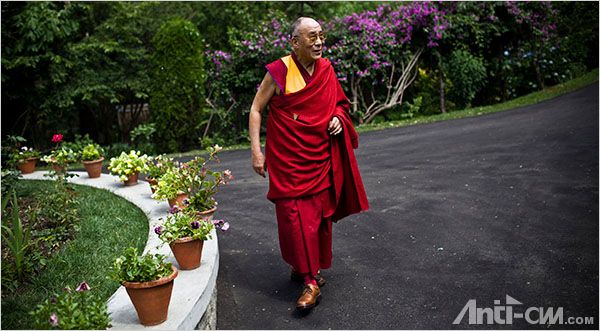|
|
本帖最后由 I'm_zhcn 于 2009-5-31 06:38 编辑
Autonomy Is Solution for Tibet, Dalai Lama Says
http://www.nytimes.com/2009/05/29/world/asia/29dalai.html
By EDWARD WONG Published: May 28, 2009

The Dalai Lama in Dharamsala, India on Monday. He says the Tibetan way of life faces “something like a death sentence” under China’s leadership. Shiho Fukada for The New York Times
DHARAMSALA, India — The influx of Han Chinese and the growing restrictions on religious practice have become the biggest threats to Tibet, which faces “something like a death sentence” under Chinese rule, said the Dalai Lama, the exiled Tibetan spiritual leader.
The only solution is to allow genuine autonomy for the six million Tibetans, he said. The regional authority would make policy on education, religious practice and the use of natural resources, while Beijing would retain the right to keep military forces in the region and oversee foreign affairs, he added.
An autonomous Tibetan government would not force out Han Chinese who had already settled in the vast Tibetan plateau in China’s west, but would place limits on any future migration. “Autonomous regions should be the native peoples’ majority,” the Dalai Lama said during an hourlong interview this week.
The Dalai Lama sought to rebut assertions by Chinese officials that the Tibetan government-in-exile’s proposal for autonomy advocated “ethnic cleansing.” The proposal was presented last October to the Chinese government, which strongly rejected it. Tibetan leaders here say they plan to finish another document by June that will clarify the proposal but not veer from its premise.
“We never thought of seriously asking the Chinese government to remove the Chinese people or Chinese military forces,” the Dalai Lama said. “In fact, we made very clear that foreign affairs and defense are up to the Chinese central government.”
During the meeting in his private residence in Dharamsala, a Himalayan hill town, the Dalai Lama, nearly 74, spoke in English on a wide range of topics, from his vision of autonomy to nostalgia for his homeland’s desert climate and deep blue skies. He chuckled throughout the talk and slapped visitors on the back.
But he sharply criticized the continuing crackdown on Tibetans. Since widespread riots and protests by Tibetans in March 2008, Tibet has become a crucial political and security concern for China, which took full control in 1951. This past winter, fearful that protests might erupt again, Chinese soldiers and paramilitary forces flooded Tibet.
“Our main concern is the Tibetan people inside Tibet,” the Dalai Lama said. “They are really passing through difficulty. So mentally, I have some heavy sort of moral responsibility to serve them, to help them. But meantime, I also have the feeling of helplessness.”
The Dalai Lama said that the Chinese government’s practice of rounding up monks and nuns to take part in “political education” campaigns was partly to blame for the protests last year. Since then, the stepping up of those campaigns and other restrictions on religious practice show that the Chinese government is “now deliberately carrying out some kind of systematic policy to eliminate Tibetan unity,” he said.
“In the hard-liner Chinese Communist view, so long as Tibetan unique cultural heritage and Tibetan Buddhist spirituality remain there, they see that as a source of threat of separation,” he said.
Chinese officials say that Tibetans have freedom of religion and that policies in Tibet are aimed at developing the remote region’s economy. They also contend that the Dalai Lama supports Tibetan independence and that he fomented the violence last year.
Lian Xiangmin, a scholar at the China Tibetology Research Center in Beijing, a government-supported institution, said that the Dalai Lama’s plan for autonomy went “against the basic political system of the country.”
The Dalai Lama said that autonomy was enshrined in the Chinese Constitution, which guarantees the right of regional self-rule for ethnic minorities. Based on that, he said, the large area of western China that is predominantly Tibetan — including Tibet, but also parts of the provinces of Qinghai, Sichuan, Gansu and Yunnan — should be united under a single Tibetan authority. Chinese officials have balked at the demand, saying it would mean turning over one-quarter of China to Tibetan governance.
The Dalai Lama said the flood of Chinese who move to Tibet for work must be curbed to prevent Tibet from going down the path of Inner Mongolia, where Han Chinese now far outnumber Mongolians. But Tibet can benefit economically from remaining part of China, he said.
“Tibet materially is very, very backward,” he said. “And every Tibetan wants to modernize Tibet. So for that reason, remaining within the People’s Republic of China is in our own interest as far as economic development is concerned, provided we have full guarantee to preserve our own culture, our own language, our own spirituality and full protection of environment.” |
autonomy, Dalai, Lama, Solution, 纽约时报, autonomy, Dalai, Lama, Solution, 纽约时报, autonomy, Dalai, Lama, Solution, 纽约时报
评分
-
1
查看全部评分
-
|